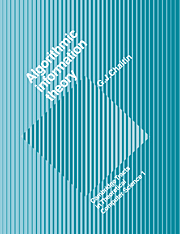Book contents
- Frontmatter
- Contents
- Foreword
- Preface
- Figures
- 1 Introduction
- I Formalisms for Computation: Register Machines, Exponential Diophantine Equations, & Pure LISP
- 2 The Arithmetization of Register Machines
- 3 A Version of Pure LISP
- 4 The LISP Interpreter EVAL
- II Program Size, Halting Probabilities, Randomness, & Metamathematics
- A Implementation Notes
- B The Number of S-expressions of Size N
- Bibliography
2 - The Arithmetization of Register Machines
Published online by Cambridge University Press: 23 November 2009
- Frontmatter
- Contents
- Foreword
- Preface
- Figures
- 1 Introduction
- I Formalisms for Computation: Register Machines, Exponential Diophantine Equations, & Pure LISP
- 2 The Arithmetization of Register Machines
- 3 A Version of Pure LISP
- 4 The LISP Interpreter EVAL
- II Program Size, Halting Probabilities, Randomness, & Metamathematics
- A Implementation Notes
- B The Number of S-expressions of Size N
- Bibliography
Summary
Introduction
In this chapter we present the beautiful work of JONES and MATIJASEVIC (1984), which is the culmination of a half century of development starting with GODEL (1931), and in which the paper of DAVIS, PUTNAM, and ROBINSON (1961) on Hilbert's tenth problem was such a notable milestone. The aim of this work is to encode computations arithmetically. As Gödel showed with his technique of Gödel numbering and primitive recursive functions, the metamathematical assertion that a particular proposition follows by certain rules of inference from a particular set of axioms, can be encoded as an arithmetical or number theoretic proposition. This shows that number theory well deserves its reputation as one of the hardest branches of mathematics, for any formalized mathematical assertion can be encoded as a statement about positive integers. And the work of Davis, Putnam, Robinson, and Matijasevic has shown that any computation can be encoded as a polynomial. The proof of this assertion, which shows that Hilbert's tenth problem is unsolvable, has been simplified over the years, but it is still fairly intricate and involves a certain amount of number theory; for a review see DAVIS, MATIJASEVIC, and ROBINSON (1976).
Formulas for primes: An illustration of the power and importance of these ideas is the fact that a trivial corollary of this work has been the construction of polynomials which generate or represent the set of primes; JONES et al. (1976) have performed the extra work to actually exhibit manageable polynomials having this property.
- Type
- Chapter
- Information
- Algorithmic Information Theory , pp. 7 - 50Publisher: Cambridge University PressPrint publication year: 1987



